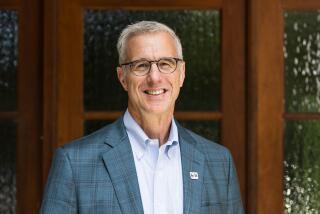Hughes Picks IBM Executive as CEO : C. Michael Armstrong’s Skills Should Help Firm Move Away From Defense
- Share via
In another signal of rapid changes overtaking the defense industry, Hughes Aircraft--the Pentagon’s largest electronics contractor--Wednesday selected an IBM executive with little background in the weapons business to become its new chairman and chief executive.
The Los Angeles-based aerospace firm, a unit of General Motors, named C. Michael Armstrong, chairman of IBM World Trade, to succeed Malcolm R. Currie, who has reached the firm’s mandatory retirement age of 65.
During Currie’s four-year tenure as chairman, Hughes undertook the defense industry’s most ambitious effort at diversification, expanding its role in the communications and aircraft simulator industries.
Armstrong, 53, who has spent the last three decades at IBM, was the firm’s third-highest executive. As head of IBM World Trade, he was responsible for IBM’s international business, which generates 60% of the firm’s sales.
With a business economics degree from Miami University in Ohio, Armstrong ran a variety of IBM’s domestic and foreign businesses. He was rumored last year to be heir-apparent toIBM Chairman John Akers, but on Wednesday he disavowed those reports as mere speculation.
Armstrong is a marked contrast to past Hughes chief executives, who held doctorates in science, started their careers at the Hughes science laboratories and often served at the Pentagon or in government intelligence agencies.
Currie, for example, holds a Ph.D. in engineering from UC Berkeley and was named an undersecretary of defense in 1973. Former Hughes Chairman Albert O. Wheelon was once deputy director of the Central Intelligence Agency.
The selection of Armstrong sends a clear message that GM is backing away from the pattern of putting career scientists in charge of the company, one insider observed. Several Hughes executives contending for Armstrong’s job have science backgrounds, and one was a former Air Force general. Armstrong was almost certainly selected by GM Vice Chairman Robert J. Schultz, who is chief executive of GM Hughes Electronics, the holding company for Hughes, according to insiders.
At a press conference Wednesday, Armstrong heaped praise on Hughes’ technological prowess. Declining to signal any plan he may have for changes, he said his first mission will be to visit as many company plants and customers as possible.
Under Currie, Hughes has aimed at transforming itself into a “balanced” high-technology company. It wants to derive 50% of its revenue from non-defense work by the end of the decade, compared to just 15% when the transformation began.
Currie said Hughes has significant commercial opportunities, but capturing them will require a new emphasis on marketing, a financial restructuring and an improvement of business skills--all of which were ingredients that led to Armstrong’s selection.
“Mike comes along at an extremely opportune moment in the corporation’s history,” Currie said.
Among Hughes’ vast technical staff of 19,000 engineers and scientists--including 1,200 Ph.D scientists--the initial evaluation of Armstrong was cautious, but positive.
“An inside guy would have a hell of a time running this place, and for an outsider it will be even more difficult,” a corporate scientist said. “This is the place where the inmates run the asylum.”
Hughes Aircraft has between 200 and 300 labs, each containing 50 to 250 scientists and engineers, he said. The labs operate as powerful--and often autonomous--centers of business. In the past, they have produced important technological breakthroughs, but also an occasional fiasco.
For years, Hughes was viewed as a technology leader, but also as a high-cost manufacturer, Currie acknowledged in an interview. Hughes has cut its work force 25% in recent years, while revenue held at $8 billion annually, indicating a sharp improvement in productivity, he said.
“We turned the corner on that. I am very proud of that,” he said.
IBM Chairman John Akers, commenting on Armstrong, said: “Our business has benefited from his strong leadership in his many assignments, but especially in his role as the senior executive responsible for our World Trade operations.”
George Haddad, chairman of the University of Michigan’s department of electrical engineering, where Armstrong serves on an advisory panel, said: “He is an impressive individual and he has a lot of vision. He is very keen on partnerships between universities and industry.”
More to Read
Inside the business of entertainment
The Wide Shot brings you news, analysis and insights on everything from streaming wars to production — and what it all means for the future.
You may occasionally receive promotional content from the Los Angeles Times.










